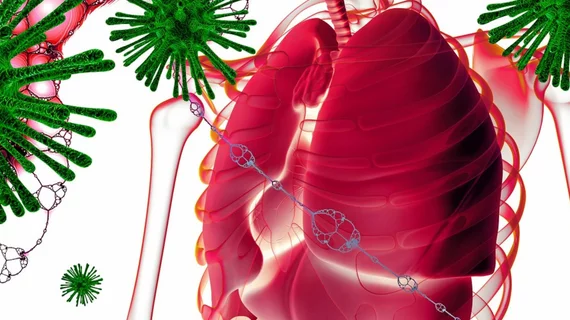Lung abnormalities completely resolve for majority of COVID pneumonia patients
Complete resolution of lung abnormalities can be expected in the majority of patients who were hospitalized with moderately severe COVID pneumonia, new imaging shows.
A study published this week in Radiology found that 12 months after hospitalization for COVID pneumonia, 93% of patients’ lung abnormalities had cleared up on follow-up chest CT scans. These patients were reported to have completely recovered from their symptoms at the one-year mark as well.
“It has been hypothesized that COVID-19 pneumonia may evolve into pulmonary fibrosis with permanent organ damage,” corresponding author Marialuisa Bocchino, MD, PhD of the Respiratory Medicine Unit, Department of Clinical Medicine and Surgery at Federico II University of Naples in Italy, and co-authors explained. “If the clinical-radiological evidence confirms the occurrence of post-COVID-19 pulmonary fibrosis, even as a less common complication, a very worrisome public health scenario would appear given the huge number of affected individuals.”
The study followed 84 patients for one year. Each patient, all of whom were previously hospitalized with COVID pneumonia, underwent non-contrast chest CT scans three, six and 12 months after baseline imaging was obtained at the time of their original diagnosis. Lung abnormalities were compared at all time points.
Ground-glass opacities were observed in 100% of participants at baseline imaging but were present in only 2% of patients at the 1-year mark. At six months post-hospitalization, consolidations dropped to 0% from 71%.
Fibrotic abnormalities, which the authors suggested were a great concern for patients recovering from COVID pneumonia, were detected at 3 months in 50% of participants, 6 months in 42% and dropped to 5% after 1 year. Out of the 84 patients who participated in the research, complete resolution of abnormalities occurred in 78. The authors noted that it is important for radiologists to “distinguish fibrotic-like abnormalities due to acute inflammatory damage that resolve from slowly progressive fibrosing tissue.”
“This differentiation is required with the intent to avoid confusion with reference to terms broadly used with the unique sense of progressive and irreversible fibrosis. Also, such a differentiation has clinical relevance when considering anti-fibrotic therapies.”
The researchers concluded by suggesting that larger, multi-center studies that can utilize dual energy chest CTs to assess pulmonary vasculature are necessary to further validate their findings.
The detailed study can be viewed in Radiology.
Related COVID research news:
Intrathoracic complications in COVID patients: Incidence, associations and outcomes
Imaging suggests blood clots are more common in COVID than pneumonia
These ultrasound features distinguish between COVID vaccine-related and malignant adenopathy
Cardiac MRI scans offer new insight into COVID vaccine-related myocarditis

